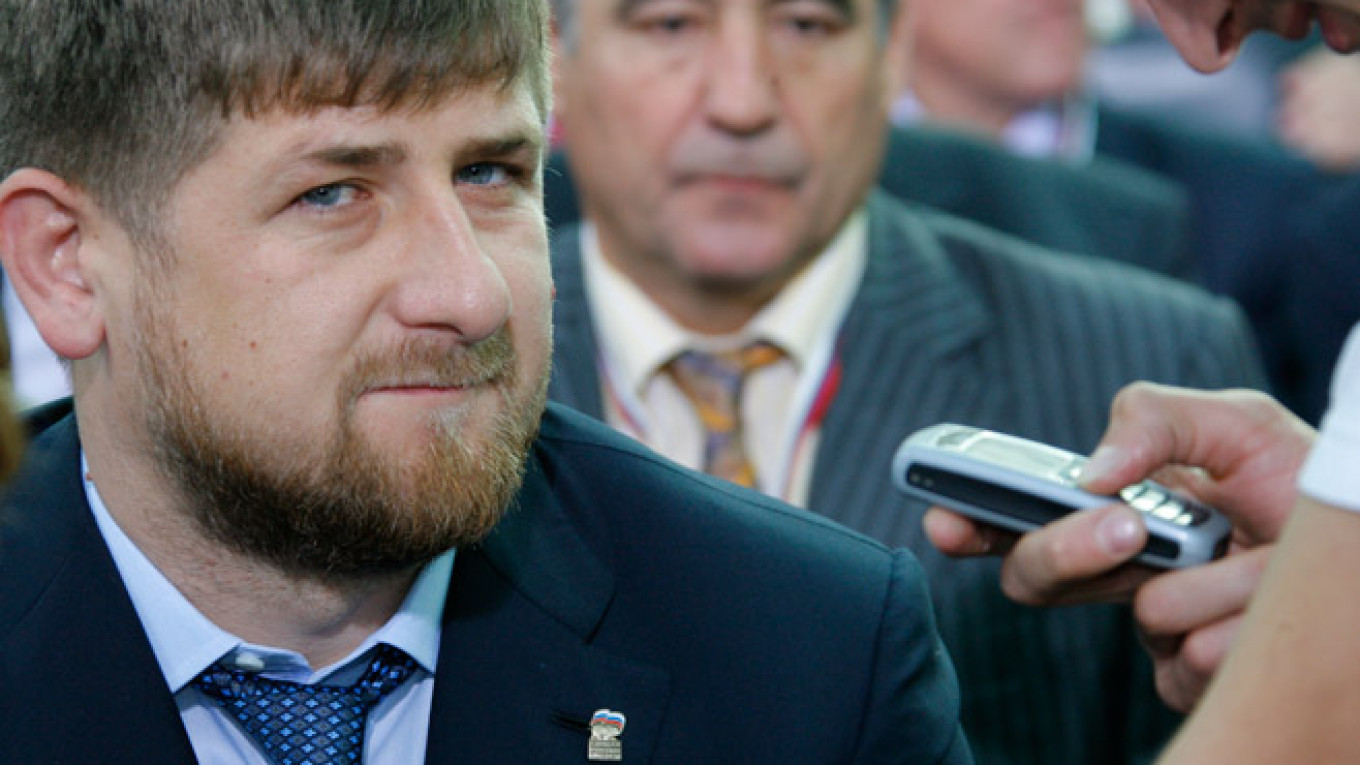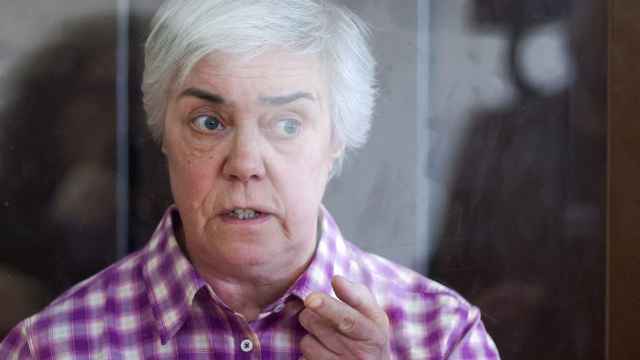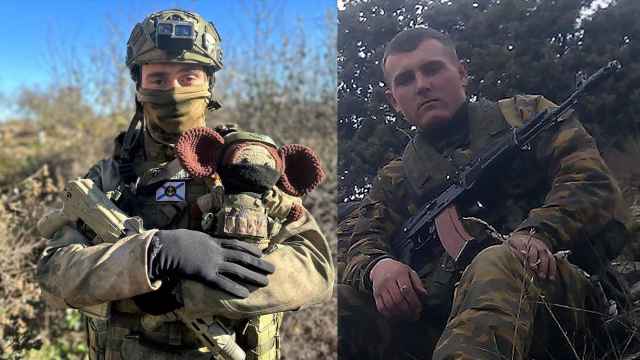There is no bad news to be found on Chechen leader Ramzan Kadyrov's Instagram page.
The Kremlin-appointed leader, whose page on the popular photo-sharing network boasts about one million followers, regularly posts snapshots and video clips touting his athletic prowess, sharing endearing family moments and documenting various milestones of a man broadly credited with having rebuilt a republic that was all but destroyed by civil unrest and two bloody wars.
But traditional media coverage of Kadyrov appears to be becoming less and less upbeat. And recent reports that a 17-year-old Chechen schoolgirl had been compelled to wed an already-married police chief three times her age have embroiled Kadyrov in yet another media frenzy. In Grozny, the ensuing backlash led to the firing of an official and a campaign of public shaming.
In comments to The Moscow Times, pundits said that the reaction to the latest scandal illustrated Kadyrov's growing insecurities about his image amid national media outlets' dwindling appetite for the relentless inflow of good news from Chechnya.
Independent newspaper Novaya Gazeta reported late last month that Kheda Goylabiyeva, 17, was being forced to marry 57-year-old Nazhud Guchigov, the head of a local police department in Chechnya's Nozhay-Yurt district. Subsequent media reports stated that Guchigov was 46. Kadyrov's spokesman, Alvi Karimov, denied Monday that the wedding had taken place over the weekend as had been anticipated.
Guchigov launched an intimidation campaign against Goylabiyeva's parents, according to Novaya Gazeta, giving them until May 2nd — the day after her 17th birthday — to surrender their daughter. Failure to do so, he claimed, would force him to take her against their will and lead to reprisals against the family.
Guchigov later dismissed Novaya Gazeta's claims against him, insisting that he loved his wife and was not planning to wed again.
Kadyrov has openly supported polygamy in the past. In 2011, he claimed he was having difficulty finding himself a second wife because he had not yet found a woman beautiful enough to be the new Mrs. Kadyrova. The Chechen leader also said that he would not have married Medni, his wife of nearly two decades, if she had been against polygamy, Russian media reported at the time.
But the Chechen leader has banned early marriage and outlawed the practice of "bridenapping," where women are abducted and forced to wed against their will.
Federal children's right ombudsman Pavel Astakhov said in an Instagram post Monday that Kadyrov's "negative" opinion of early marriages had led to their steady decline in the republic, adding that violations of the rights Goylabiyeva could not be confirmed.
"Kadyrov aims to create an image that goes far beyond Chechnya's borders," said Nikolai Petrov, a political analyst with the Higher School of Economics in Moscow. "He wants to project an international image that puts him among the ranks of the Muslim leaders of the world. This is why image is crucially important for him."
Kadyrov's campaign to present himself as a worthy leader seems to have proven effective among the Russian population. A survey conducted in February by independent pollster the Levada Center found that 56 percent of Russians harbor positive feelings toward him. The poll — conducted among a representative sample of 1,600 adults from 46 regions and carrying a margin of error no greater than 3.4 percent — also showed 64 percent of the population believes he was brought to power to restore order in the republic, which in fact was the case.
Yet Kadyrov has violated his own preachings, endorsing the planned wedding last week. He said he had sent a "most trusted person" to speak with Goylabiyeva's family and that they had agreed to the union, the Kommersant newspaper reported. Under Russian law, second marriages — permissible in traditional practice for Chechen men — cannot be registered as an official partnership. The Russian Civil Code stipulates that 18 is the minimum age for marriage but contains clauses that allow for marriage at 16 in certain exceptional cases.
Kadyrov said last week he was upset that nationwide media had picked up the story, insisting that the issue should have remained among local journalists. Kadyrov dismissed Shaid Zhamaldayev from his role as Chechen press and information minister, castigating him on television for his alleged mismanagement of the scandal.
Political analysts agreed that early marriage stories in Chechnya and other local scandals had garnered little interest among national media outlets, although Kadyrov still made headlines for his boisterous support of the Kremlin. The interest across Russia in stories that show Kadyrov in an unflattering light has been on the rise since the Chechen leader's name emerged in the investigation into the murder of opposition leader Boris Nemtsov, who was gunned down steps from the Kremlin in late February.
"This is not the first time there has been such a scandal in Chechnya, but in the past we rarely heard about anything like this," said Igor Bunin, the director of the Moscow-based Center of Political Technologies think tank. "The media simply didn't cover such happenings. The recent scandals involving Kadyrov, most importantly the Nemtsov case, have marked a change in the media's approach toward him. Now they use every chance they get to reveal his true face."
The main suspect in the Nemtsov investigation, Zaur Dadayev, served as a deputy commander of the feared Sever battalion, a force reputed for its brutal crushing of the Islamist insurgency in Chechnya and neighboring Ingushetia. Kadyrov wrote in an Instagram post shortly after the murder that he knew Dadayev to be a "true Russian patriot." The lawyers of Nemtsov's children have appealed to the Investigative Committee to interrogate Kadyrov and other top Chechen officials in connection with the case.
Political analysts have claimed that the arrest of suspects with ties to Kadyrov has shown that the Chechen leader overstepped the boundaries of his powers, leading the national press to pounce on stories that could discredit him.
Last month, Russian media extensively covered Kadyrov's claim that he had allowed his top law enforcement officers to open fire at police from other federal subjects after officers from the neighboring Stavropol region killed a fugitive in Grozny. Analysts said at the time that Kadyrov's comments demonstrated a rift between the Chechen leader and the Russian law enforcement apparatus, and voiced concern that he has created a system independent from that of Russia.
"There are two personalistic leaders in Russia," Petrov said. "One is Putin, the other is Kadyrov. What is worrisome here is that some things that happen in Chechnya under Kadyrov constitute violations of Russian law."
A Message from The Moscow Times:
Dear readers,
We are facing unprecedented challenges. Russia's Prosecutor General's Office has designated The Moscow Times as an "undesirable" organization, criminalizing our work and putting our staff at risk of prosecution. This follows our earlier unjust labeling as a "foreign agent."
These actions are direct attempts to silence independent journalism in Russia. The authorities claim our work "discredits the decisions of the Russian leadership." We see things differently: we strive to provide accurate, unbiased reporting on Russia.
We, the journalists of The Moscow Times, refuse to be silenced. But to continue our work, we need your help.
Your support, no matter how small, makes a world of difference. If you can, please support us monthly starting from just $2. It's quick to set up, and every contribution makes a significant impact.
By supporting The Moscow Times, you're defending open, independent journalism in the face of repression. Thank you for standing with us.
Remind me later.






